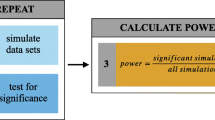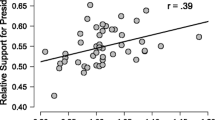Abstract
The principle of common cause asserts that positive correlations between causally unrelated events ought to be explained through the action of some shared causal factors. Reichenbachian common cause systems are probabilistic structures aimed at accounting for cases where correlations of the aforesaid sort cannot be explained through the action of a single common cause. The existence of Reichenbachian common cause systems of arbitrary finite size for each pair of non-causally correlated events was allegedly demonstrated by Hofer-Szabó and Rédei in 2006. This paper shows that their proof is logically deficient, and we propose an improved proof.
Similar content being viewed by others
Notes
Notice that the logical direction of the proof is opposite to the direction in which it is presented.
References
Reichenbach, H.: The Direction of Time. University of California Press, Berkeley (1956)
Salmon, W.C.: Scientific Explanation and the Causal Structure of the World. Princeton University Press, Princeton (1984)
Cartwright, N.: How to Tell a Common Cause: Generalizations of the Common Cause Criterion. In: Fetzer, J.H. (ed.) Probability and Causality: Essays in Honor of Wesley C. Salmon, pp. 181–188. D. Reidel Publishing Company, Dordrecht (1988). https://doi.org/10.1007/978-94-009-3997-4_8
Cartwright, N.: Nature’s Capacities and Their Measurement. Clarendon Press, Oxford (1989)
Mazzola, C.: Correlations, deviations and expectations: the extended principle of the common cause. Synthese 190, 2853 (2013). https://doi.org/10.1007/s11229-012-0089-8
Arntzenius, F.: The common cause principle. PSA: Proceedings of the Biennial Meeting of the Philosophy of Science Association, vol. 2, p. 227 (1992). https://doi.org/10.1086/psaprocbienmeetp.1992.2.192838
Williamson, J.: Bayesian Nets and Causality: Philosophical and Computational Foundations. Oxford University Press, Oxford (2005)
Hofer-Szabó, G., Rédei, M., Szabó, L.E.: The Principle of the Common Cause. Cambridge University Press, Cambridge (2013)
Hofer-Szabó, G., Rédei, M., Szabó, L.E.: On Reichenbach’s common cause principle and Reichenbach’s notion of common cause. Br. J. Philos. Sci. 50, 377 (1999). https://doi.org/10.1093/bjps/50.3.377
Hofer-Szabó, G., Rédei, M.: Reichenbachian common cause systems. Int. J. Theor. Phys. 43, 1819 (2004). https://doi.org/10.1023/B:IJTP.0000048822.29070.0c
Mazzola, C.: Reichenbachian common cause systems revisited. Found. Phys. 42, 512 (2012). https://doi.org/10.1007/s10701-011-9622-8
Stergiou, C.: Explaining correlations by partitions. Found. Phys. 45, 1599 (2015). https://doi.org/10.1007/s10701-015-9945-y
Hofer-Szabó, G., Rédei, M.: Reichenbachian common cause systems of arbitrary finite size exist. Found. Phys. 36, 745 (2006). https://doi.org/10.1007/s10701-005-9040-x
Wroński, L., Marczyk, M.: Only countable Reichenbachian common cause systems exist. Found. Phys. 40, 1155 (2010). https://doi.org/10.1007/s10701-010-9457-8
Marczyk, M., Wroński, L.: Completion of the causal completability problem. Br. J. Philos. Sci. 66, 307 (2015). https://doi.org/10.1093/bjps/axt030
Acknowledgements
We are appreciative of useful discussion with Michał Marczyk and Leszek Wroński, and comments from Gábor Hofer-Szabó and an anonymous referee. Both authors acknowledge the support of the University of Queensland. PWE would like to acknowledge funding support from the Templeton World Charity Foundation (TWCF 0064/AB38) and the Australian Government through the Australian Research Council (DE170100808).
Author information
Authors and Affiliations
Corresponding author
Rights and permissions
About this article
Cite this article
Mazzola, C., Evans, P.W. Do Reichenbachian Common Cause Systems of Arbitrary Finite Size Exist?. Found Phys 47, 1543–1558 (2017). https://doi.org/10.1007/s10701-017-0124-1
Received:
Accepted:
Published:
Issue Date:
DOI: https://doi.org/10.1007/s10701-017-0124-1




